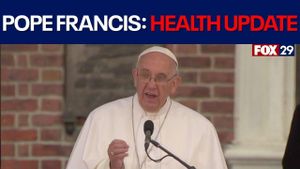The Indonesian government is taking significant steps to support education and social welfare with the launch of various initiatives targeted at enhancing student activity and engagement during the holy month of Ramadan. One notable program is the "Ramadan Produktif," rolled out by the provincial government of East Java aimed at high school and vocational students.
Gubernur Jawa Timur Khofifah Indar Parawansa announced the program as part of the government's response to the Joint Circular (Surat Edaran Bersama) issued by multiple ministries earlier this year. She stated, "Program ini dibuat untuk murid agar mereka tetap aktif dan produktif selama tidak berada disekolah. Selain siswa aktif secara akademik, mereka juga didorong untuk memperdalam ibadah serta beramal." This initiative is particularly timely, with the school calendar adjusted to accommodate learning during Ramadan, with holidays scheduled for the end of February and early March 2025.
The Ramadan Produktif program encourages students to engage in personal study and self-improvement outside the traditional classroom setting. Khofifah emphasized the importance of guidance from teachers, stating they will continue to play a central role, even as students participate independently. The governor also encouraged social engagement through group activities, such as visiting orphanages, saying, "Kegiatan ini meskipun dilakukan berkelompok oleh murid, guru kelas tetap harus mengkoordinir dengan mengumpulkan pakaian yang layak pakai dan juga berbagi makanan buka puasa untuk sesama."
Meanwhile, the program has broader educational goals as well. According to Kepala Dinas Pendidikan Jatim Aries Agung Paewai, schools are expected to integrate religious education during this period. They will offer learning sessions like tadarus Al Quran, pesantren kilat, and instruction for non-Muslim students to engage with activities reflective of their beliefs. "Bagi siswa Muslim, kegiatan ini dapat berupa tadarus Al Quran, pesantren kilat, dan kajian keislaman. Sementara itu, siswa non Muslim dianjurkan untuk mengikuti kegiatan keagamaan sesuai dengan keyakinan masing-masing," Aries explained.
On the governance side, initiatives are also underway to refine social aid distribution through the National Unified Data System (DTSEN). Concerns have been raised by Wakil Menteri Sosial Agus Jabo Priyono about inaccuracies within the current databases, highlighting the existence of two million inactive identification cards still receiving benefits. He stated, "Tidak menutup kemungkinan hal ini akan ada perubahan KPM (Keluarga Penerima Manfaat) dan PM (Penerima Manfaat)." This highlights the urgency for data verification and ensuring the aid reaches the intended recipients.
Agus has outlined steps for continuous updating of DTSEN data, which includes community input at various governmental levels. He noted the aim to conduct assessments to confirm eligibility for receiving government support. This diligence aims to address both inclusion and exclusion errors evident from current assessments.
The synergy between government efforts and community engagement is becoming increasingly important, seen through the collaborative relationships forming with organizations such as the Pergerakan Mahasiswa Islam Indonesia (PMII). Alluding to the future direction of governance, Wakil Walikota Banjarmasin Ananda expressed the need for active collaboration with youth organizations. She remarked, "Jangan sungkan untuk datang ke kantor pemko untuk menemui Ka Yamin ataupun saya," demonstrating the administration's openness to dialogue and partnership.
PC PMII Kota Banjarmasin's newly elected leadership has echoed these sentiments, promising to work together and address local challenges such as waste management and urban flooding. Their stance is clear: support for beneficial policies and candid discourse for those perceived as flawed.
These initiatives and programs, especially around the sacred month of Ramadan, reflect the Indonesian government's commitment to proactive engagement with youth and communities. They aim to instill productive habits, build character, and promote social responsibility among students, ensuring their contributions extend beyond the classroom.
Through these coordinated efforts, the Indonesian government seeks not only to aid its people during Ramadan but to chart a course for sustainable engagement and support across various sectors, promising to create lasting impacts on both education and welfare.



